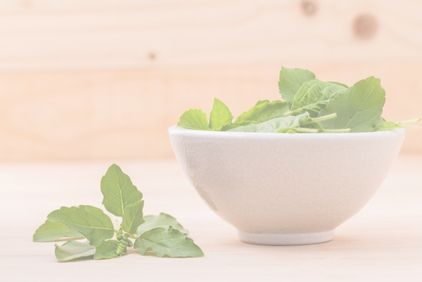Known scientifically as Ocimum sanctum, holy basil, or Tulsi, is a plant revered by Indians and in the Ayurvedic tradition for its many benefits. Native to India, it is an important component of traditional Ayurvedic medicine, playing a role in maintaining physical and mental balance.
History and origin of holy basil

Holy basil, deeply rooted in Indian tradition, has been used for thousands of years. In the past, it was valued as much for its medicinal properties as for its spiritual significance.
For the record, in India, tulsi is associated with the cult of Lakshmi, goddess and wife of the god Krishna.
Legend has it that it turned into a branch of Tulasi (or Tulsi), which is why this plant is considered sacred. It has always been linked to immortality. Used to chase away evils and demons, charged with purifying men, likely to accompany them to heaven, this plant has an undeniable "spiritual" character.
That's why you'll find a pot of holy basil in almost every home in India: placed there as much for protection against evil spirits as to improve the daily vitality and fitness of the inhabitants...
Considered a versatile herb, holy basil has also been used to treat a variety of ailments and health conditions, testifying to its enduring value in traditional Indian medicine, Ayurveda.
The role of holy basil in Ayurveda and its applications

Tulsi plays a central role in Ayurveda as a Rasayana, strengthening the vital force and rebalancing the doshas. It soothes Vata and Pitta, while restoring balance to Kapha.
Tulsi is also particularly appreciated in Ayurveda for its action on the respiratory, digestive and nervous systems:
➢Action on the pulmonary sphere: tulsi is an invaluable ally, either in the case of occasional infections (e.g., problems related to the ENT sphere), or in the case of "respiratory allergies", whether chronic or circumstantial, e.g., related to pollens. Its anti-bacterial and purifying composition enables tulsi to free up breathing while purifying the bronchi.
➢Digestion: Tulsi regulates the entire pancreatic function. The pancreas has the onerous task of managing all the sugars that the "modern" diet (industrial pastries, business meals, stress cravings) brings us.
➢Nervous system: In Ayurveda, tulsi is also known as an adaptogen, i.e., a plant reputed to help the body adapt and resist stress more effectively, whether physical, mental or environmental. Holy basil is therefore particularly appreciated when you're looking to relax both physically and mentally. It is also a plant much used in meditation.
The multiple uses of holy basil in Ayurveda thus highlight its versatility and underline its crucial role as a medicinal herb in supporting our overall health.
Using organic Tulsi in everyday life

Incorporating organic Tulsi into your daily routine can be an excellent natural way to improve your general well-being. Whether as a dietary supplement, in cooking or in your spiritual practices, Tulsi is sure to find its place in your daily routine.
Here are a few suggestions for incorporating this versatile herb full of benefits:
➢As a dietary supplement: This is one of the quickest and most convenient ways to incorporate holy basil into your routine. In capsule or powder form, it's easy to take. Choose organic Tulsi to benefit from all the virtues this plant has to offer, without pesticides, for pure, preserved nutrients.
➢Infusions or teas: Holy basil is best consumed as an infusion, alone or blended with other herbs and teas. This is the most common and traditional way to use the plant. It soothes the mind and gently stimulates digestion. Its distinctive taste is sure to please, making it the perfect ally for comforting breaks.
➢Cooking: less commonly used in the West, fresh organic Tulsi leaves can be added to dishes for their distinctive flavor.
➢Spiritual practices: In many traditions and practices, including Ayurveda, Holy Basil is used to promote mental clarity, protection and purification. Its leaves can be eaten during your meditation session or placed on an altar to take full advantage of its soothing aroma.
Holy basil, for optimal well-being
Sacred Basil stands out for its many benefits, rooted in Indian and Ayurvedic tradition. Its beneficial properties for lung, digestive and nervous system health make it an invaluable daily ally. Whether as a dietary supplement, an infusion, in cooking or during spiritual practices, integrating Tulsi into our routines offers a natural approach to improving our overall well-being. In short, Tulsi is a versatile herb which, thanks to its spiritual history and health benefits, can be an important addition to our daily lives.










